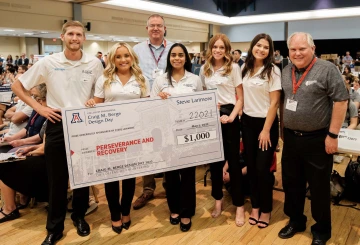Medical Device Team Overcomes Setback Just in Time

Project Title: Optimal Valve Diaphragm and Membrane Design for Use in Medical Catheters
Team 22021 Members:
Colette Doerr, biomedical engineering
Kelsi Petrillo, biomedical engineering
Sydney Schreiner, biomedical engineering
Mansi Singh, project lead, biomedical engineering
Max Tucker, materials science and engineering
Sponsor: Xeridiem Medical Devices, part of Spectrum Plastics Group
The interdisciplinary capstone experience is designed to prepare students for the workplace, where setbacks can occur at crucial points. That’s why a team that has risen above challenges is recognized with the Steve Larimore Award for Perseverance and Recovery each year at Craig M. Berge Design Day.
This year, Team 22021 earned the recognition and $1,000 prize. About a week prior to Craig M. Berge Design Day, the team confirmed what they had suspected – a machine that was key to their fabrication process wasn’t working properly.

The team, accompanied by Craig M. Berge Dean David Hahn and Steve Larimore, poses with the award check
They were tasked with creating a prototype of a membrane for medical catheters that’s made to burst at a specific pressure when a blockage occurs, allowing fluid to move through the opening created. One potential application is a brain shunt used to drain cerebrospinal fluid.
The most critical part of the design is slit geometries that are cut into the membranes with great precision using a laser. But the team discovered the laser cutter’s lens had cracked. So they scrapped measurements they’d been recording from February through April and started over with a new lens at the Spectrum Plastics Group facility, also known as Xeridiem Medical Devices in Tucson.
They worked with Spectrum/Xeridiem to find times that wouldn’t interfere with production and maximized their efficiency. While one member was cutting membranes, others were testing them, said biomedical engineering major Kelsi Petrillo.
“It took lot of effort, but mostly teamwork and all of us being dedicated to getting it done,” she said.
Results became more consistent after the lens was replaced. The cutter began making clean slits all the way through the liquid silicone rubber rather than only in spots, and the membranes reliably burst within the expected range of 13 to 15 psi. The team could confirm their slit geometries were effective.
“As far as I’m concerned, that’s what the award is all about,” said Steve Larimore, sponsor of the prize and faculty mentor for the team. “They could have given up and we would have all said, ‘It’s okay, it’s not your fault.’ But they were determined to show their design worked.”
Working through challenges in an industrial setting was valuable for team lead and biomedical engineering major Mansi Singh.
“I had a great experience learning how I would work in a company. In the future I would love to be in that environment,” she said.
This is one of the reasons Spectrum Plastics Group sponsors Interdisciplinary Capstone projects, said Vice President of Sales – Vascular Technologies Paul Melnychuck. The partnership shows students what they can expect and gives hiring managers access to a talent pipeline. Spectrum hires one or two paid interns or full-time engineers from the capstone program each year on average.
“As a result, a large percentage of our engineering organization has come through this program,” he said. “We’re always impressed with what the students come up with, in terms of their ingenuity and creativity.”
As in most cases, the company assigned Team 22021 a “moonshot,” or ambitious, project that would help them meet a business need. The students did a good job of taking the company closer to responding to an opportunity to manufacture the membrane device, Melnychuck said.
Team member Max Tucker was happy to use his materials science and engineering education in the role of procurement lead.
“It was fulfilling that after four years I could apply what I’ve learned to a real-world setting and a project that could actually save people's lives,” said Tucker.

